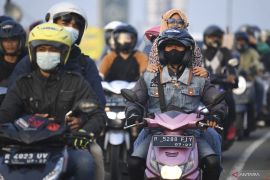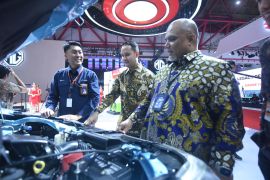"Traders or brokers who till now are considered a group of oil mafia no longer have any roles," Vice President of Pertamina`s Communications Affairs Ali Mundakir said.Jakarta (ANTARA News) - State-owned oil and gas company Pertamina has denied that crude imports have been done by involving traders and brokers, often referred to as oil mafia, an executive at Pertamina said.
Vice President of Pertaminas Communications Affairs Ali Mundakir said in a release on Wednesday that oil imports were done by inviting the oil and other fuel producers.
The imports were carried out through Pertaminas subsidiary Pertamina Energy Service whose stake is 100 percent owned by Pertamina.
Thus, Ali said, there was no longer any role played by traders--let alone by brokers--in the imports of crude oil and other fuels.
"Traders or brokers who till now are considered a group of oil mafia no longer have any roles," he added.
He said that Pertamina regretted the accusation that a group of brokers were involved in the importation of crude oil into the country.
"Every year, Pertamina--including Petral--is also audited by the State Audit Board (BPK), and the procedures of the importation continue to be monitored by the BPK," Ali asserted.
He also said that some of the requirements for crude oil and other fuels had to be met with imports.
Indonesias fuel consumption continues to increase while its crude oil production is declining.
"In an effort to ensure the availability of fuels and energy resilience, imports of fuels and crude oil must be carried out at present and in the coming several years," he stated.
He said that the company has also continued to increase efficiency through transparent process in the procurement of fuels and crude that could be processed at the companys oil refinery plants.
In its effort to reduce dependence on imports, Pertamina has also increased the capacity of its oil refinery plants, by both building new plants in cooperation with its partners and increasing the capacity of the existing plants.
He said that Pertamina has worked out a development concept of its existing plants, namely those in Balongan, Cilacap, Balikpapan, Plaju, and Dumai, with an increase in production capacity by around 50 percent in 2018.
"If these projects are completed, fuel oil imports could be reduced and the national energy resilience could be increased," he added.
Ali Mundakir had earlier stated that Pertamina will add liquefied petroleum gas (LPG) stock in some regions in anticipation of a fuel consumption hike ahead of Ramadan to Idul Fitri day.
Ali Mundakir remarked that LPG consumption during Ramadan and Idul Fitri was forecast to not increase phenomenally throughout the country.
"People need not worry about the LPG stock, as Pertamina guarantees its availability," he emphasized.
Ali noted that during Idul Fitri, however, the consumption will shift from large cities to home-bound travel destination areas, especially in Central Java, East Java, and West Java.
Therefore, as the first step, Pertamina will add 2.95 million units of the 3-kilogram LPG stock in Jakarta, West Java, and Banten area.
For West Java, Pertamina will add 2 million units of the 3-kilogram LPG, where the daily use has reached 1.15 million units.
In regions in Jakarta, which consume 338 thousand units of the 3-kilogram LPG per day, Pertamina will add 506 thousand units.
Banten will receive 419 thousand units of the 3-kilogram LPG, to add to its daily use, which is 280 thousand units.
Pertamina will also increase LPG stock in regional marketing V, including East Java, Bali, West Nusa Tenggara, and East Nusa Tenggara.
Giri Santoso, the head of Pertamina Regional Marketing V, stated that until May 2014, the consumption of LPG in the area had reached 458,010 tons or 46 percent of the quota of 998,088 tons.
According to Giri, ahead of the fasting month, Pertamina will increase 10-12 percent of its 3-kilogram and 12-kilogram LPG stocks from normal consumption, which had reached 91,600 ton per month.
"LPG consumption in the beginning and end of Ramadan will generally increase in East Java and West Nusa Tenggara, while in Bali and East Nusa Tenggara it will remain stable," he pointed out.
Until April 2014, Pertamina had distributed 1,572 million units of the 3-kilogram LPG from its set target of 4,783 million units.(*)
Editor: Heru Purwanto
Copyright © ANTARA 2014











